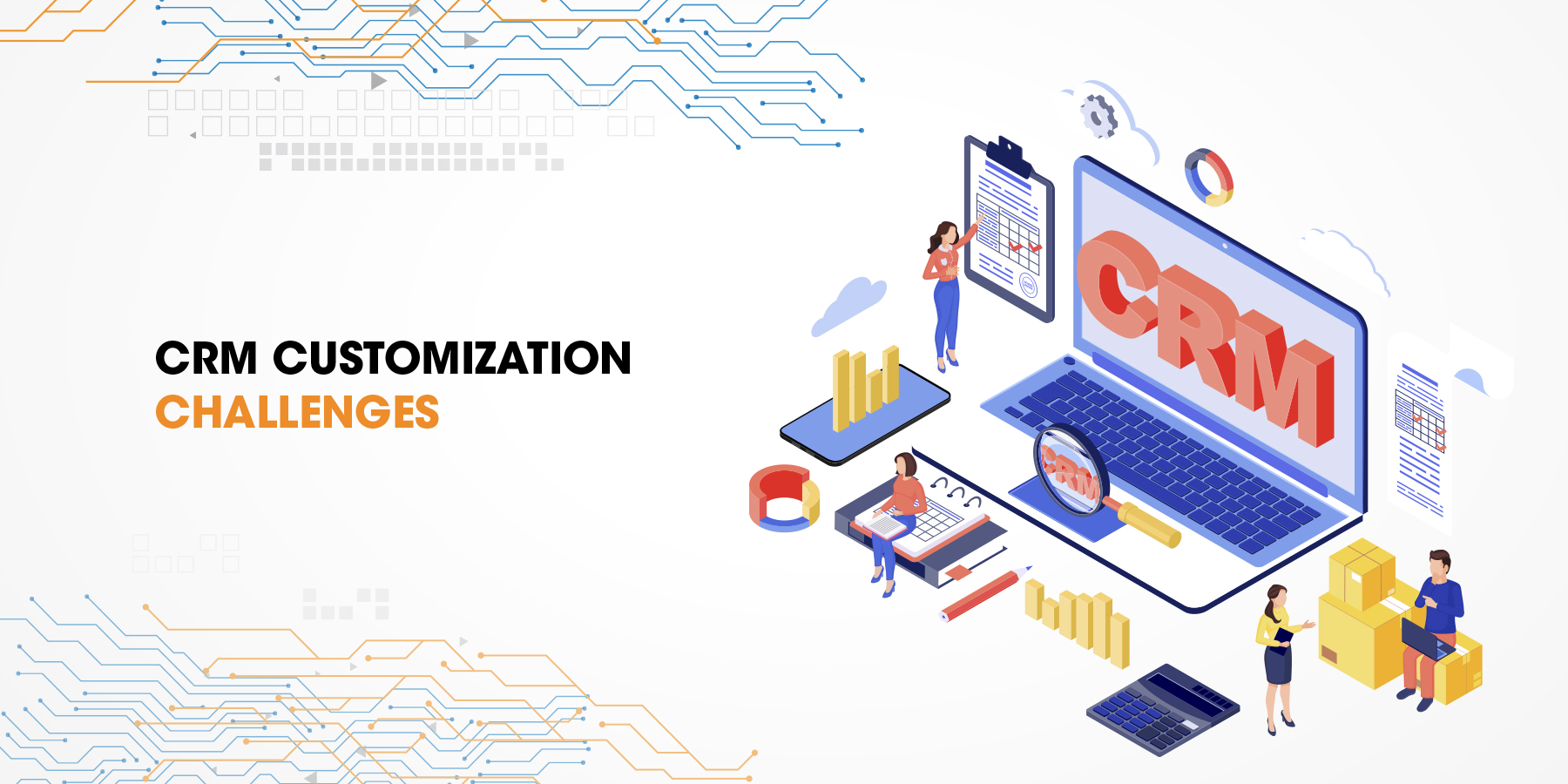Top 9 Challenges in CRM Customization and How to Overcome It
You might be wondering why CRM customization challenges are such a big deal in today’s business world. The challenges that come with CRM customization can lead to lost time, money, and resources, not to mention the frustration of your staff, who have to struggle through it all. With that being said, the challenges of CRM customization are both numerous and difficult – but this doesn’t mean you should give up.
With the introduction of new versions, challenges of CRM continue to arise, and it can be difficult to know how to overcome them. But they are not insurmountable – there are many different ways to solve them.
In this blog post, we will discuss:
- The challenges of CRM customization
- How you can overcome challenges by getting out of your own way
- Ways to ensure that your CRM is working as efficiently as possible
Let’s get started.
Challenge 1: Managing Integrations
The challenges of CRM customization are not limited to the development side. The challenges can also be found in managing integrations between your CRM and other business applications, especially if they’re custom-built for you by a third party. Not only does this increase the time spent on maintenance, but it makes scaling challenging once you outgrow one software solution and need to move to another.
There are a couple of ways you can overcome challenges like these:
- First, make sure your CRM is as streamlined as possible
- Second, choose integrations that work for you instead of letting them dictate the way your business runs.
By keeping everything up-to-date and running smoothly across all platforms, you can avoid many of the challenges that come with CRM customization. Moreover, managing integrations that scale with your business and give you the freedom to run day-to-day operations without having to worry about challenges is a surefire way of increasing productivity.
Challenge 2: Lacking Scope Clarity
When you begin to customize your CRM, it’s essential that everyone involved understands the objectives and what is expected from the process. If there is a lack of clarity on scope – or if different team members have different interpretations of it – this can lead to challenges down the line.
One way to overcome this challenge is by ensuring that everyone has a common understanding of the objectives and that they are written down in a clear and concise way. This will help to avoid any challenges or confusion when it comes time to start customization.
Another way to overcome this challenge is by using sprints during customization. By breaking the project down into smaller, more manageable chunks, you can ensure that everyone involved has a clear understanding of what needs to be done and when. This will not only help you overcome challenges but also keep the process moving quickly forward, which is essential for any business looking to stay competitive in today’s market.
Challenge 3: Choosing the Wrong CRM
When it comes time to choose a CRM, many businesses make the mistake of choosing the first one that looks good or is within their budget. However, this can often lead to challenges down the line as the CRM may not be a good fit for your specific business needs.
One way to overcome this challenge is by doing your research and taking the time to find the CRM that is right for you. This may mean trying out a few different CRMs or even working with a consultant who can help you find the one that is perfect for your business.
Another way to overcome this challenge is by customizing your CRM from the beginning. By tailoring it to fit your specific needs, you can avoid the challenges that come with using a CRM that is not fully compatible with your business.
In today’s market, it’s essential to find a CRM that fits your needs and can be customized to meet those specific needs. By overcoming the challenges associated with customization, you are ensuring that your CRM runs as smoothly and efficiently as possible.
Challenge 4: Dealing with Cost and Time of CRM Implementation
When you first implement a CRM, there is often a cost and time associated with it. This can be a challenge for businesses who are looking to get up and running quickly or those who are on a tight budget.
You can overcome this challenge by doing your research and choosing the CRM that is right for your business. There are many different CRMs available on the market, so take the time to find one that fits both your needs and your budget.
Another way to overcome this challenge is by planning ahead. By taking the time to plan out each step of the implementation process, you can ensure that everything goes smoothly and without any challenges. This will help reduce costs and save time in the long run.
Challenge 5: Trusting the Technology
When you’re faced with challenges, it can be easy to think that technology is the problem. However, this isn’t always true – challenges often arise because of human error or a lack of communication between team members.
One way to overcome this challenge is by being open and honest about any challenges that come up along the way. By communicating openly with your team about what needs to happen next, you can ensure that everyone involved knows exactly where they stand at all times. This will not only improve workflow but also reduce challenges in the long run as well!
You also need to work closely with your IT department on customization projects from the beginning. If there are going to be issues down the line – such as challenges with your CRM or compatibility issues – then you need to know about them from the beginning.
Challenge 6: Handling Data Security
When you first start using CRM, it’s important to handle data security. Since CRMs are often used to store sensitive information, such as customer and client information, this is a challenge that every business needs to be aware of from the beginning.
To maintain data security, you need to choose your software carefully. You want a CRM that meets all industry regulations and has strict protocols in place for handling sensitive data – but you also need one that will work seamlessly within your system without causing challenges down the line.
Moreover, to overcome challenges associated with data security, you need to be proactive about customizing your software from the very beginning. By planning ahead and taking steps like defining roles early on or creating templates for standard documents, you can ensure that your CRM is running smoothly and securely from the very beginning.
Challenge 7: Ignoring Favored Software, Programs, and Tools
When it comes to the challenges of CRM, you can’t afford to ignore the software and tools that are already being used within your business. You need to take them into account when customizing CRMs or designing workflows, so everything is integrated seamlessly with one another.
You also need to know what kinds of programs and tools people use outside of their CRM – for example, do they lean heavily on Excel? If so, then you want a CRM that integrates smoothly with this program or tool, at the very least. By understanding how these things interact before making customizations, you will be less likely to run into challenges in the future.
Another way around challenges is by planning ahead during your implementation process. This means choosing a CRM that is compatible with the software and tools that are already in use, as well as being aware of how people like to work outside of CRM.
Challenge 8: Convincing your Staff and Employees to Change
The challenges of CRM are often faced when employees resist change. Whether they’re more comfortable with the old system or simply don’t feel like it will provide enough benefits to make up for switching systems, you need to be able to convince them that this is a necessary step forward.
To overcome challenges in convincing your staff and employees about updating their CRMs, there are several steps you can take:
- Present detailed data on why making these changes will benefit everyone involved
- Offer incentives for early adoption
- Share success stories from other businesses that have made similar updates without any issues. These kinds of personal testimonials go a long way towards showing how beneficial it really is!
You also want to make sure that you’re taking the time to listen to your employees and understand their concerns. Address these openly and honestly, so everyone feels like they have a voice in this process. By working together, you can overcome any challenges that come up during CRM customization.
Challenge 9: Management Approval
Before you begin CRM Customization or designing workflows, it’s important to get management approval. This ensures that the changes being made are in line with organizational goals and will benefit everyone involved – not just one department.
You also want to make sure that your organization invests in tools like surveys and polls for employees, so they feel like their voices are heard during this process! Be open about challenges faced by other businesses who have taken similar steps towards updating their CRMs, as well as detail all of the benefits staff can expect once everything is up and running smoothly again.
Conclusion
The challenges of CRM customization can often seem overwhelming, but by taking the time to plan ahead and establish clear communication channels, you can overcome any hurdles that come up. Keep in mind that these challenges are not unique to your business.
At Vgrow, we have a team of skilled and experienced professionals who are able to handle all your CRM business needs. We can help with everything from customization to data migration and more. Moreover, our CRM experts are always up for a challenge and can help you overcome any challenges that come up during CRM customization. Contact us today for more information!

Kimberly Morrison
Kimberly Morrison has been the Director of Client Relations at VGROW since 2019. She builds strong customer relationships, drives client retention, and oversees team productivity. Kimberly's approach to customer engagement is key to VGROW's aim of streamlining business processes through virtual assistance services.
Author
Kimberly Morrison
Kimberly Morrison has been the Director of Client Relations at VGROW since 2019. She builds strong customer relationships, drives client retention, and oversees team productivity. Kimberly's approach to customer engagement is key to VGROW's aim of streamlining business processes through virtual assistance services.





